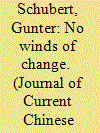| Srl | Item |
| 1 |
ID:
183446


|
|
|
|
|
| Summary/Abstract |
The author considers the development of Taiwan's position on historical claims to the waters, islands, skerries, and resources of the South China Sea under international law. The article compares the approaches of Taiwan's two leading political parties (Nationalist and Democratic Progressive) to substantiating the country's claims on the natural resources and adjacent waters. The reasons for the emergence and disappearance of the concept in Taiwanese law of "historic waters" to which the jurisdiction of the Republic of China (Nationalist China) should presumably extend are discussed in detail. Special attention is given to Taiwan's measures for the "effective occupation" of two islands (Taiping and Pratas) in the South China Sea. Changes in Taiwan's official position under different administrations are analyzed. While agreeing on everything where Taiping Island is concerned, the Nationalist and Democratic Progressive parties differ over all other pieces of land in the South China Sea. De facto correspondence of the foreign policy positions of Mainland China and the Nationalists, stemming from ideas of a common Chinese identity, is revealed in examining approaches to interpreting the notorious "U-shaped line." The Progressive Democrat-ic Party's attitude toward the South China Sea is due to the Taiwanese identity of its supporters. An obvious contradiction is noted: On the one hand, the Progressive Democrats proclaim the sovereignty of Taiwan (the Republic of China) over all islands in the South China Sea while supporting the unity of the "two shores of the Strait" on the issue of China's territorial integrity. On the other, it pragmatically recognizes the impossibility of actually exercising its nominal sovereignty over the disputed territories, and its doubtfulness from the viewpoint of international law. Nuances in Taiwan's attitude toward the Hague Tribunal's verdict on the Philippines' suit against China, reflected in a number of government statements, are examined in detail. Reasons for the Tribunal's refusal to recognize Taiping Island, the largest in the Pratas group, are identified.
|
|
|
|
|
|
|
|
|
|
|
|
|
|
|
|
| 2 |
ID:
114788


|
|
|
|
|
| Publication |
2012.
|
| Summary/Abstract |
This article discusses Taiwan's first combined national elections, held in 2012. Though the Democratic Progressive Party (DPP), the largest opposition party, fared much better in the Legislative Yuan elections than in 2008, DPP presidential contender Tsai Ying-wen's clear defeat at the hands of the Kuomintang incumbent, Ma Ying-jeou in the presidential race came as a surprise. The article examines the election campaigns of both Tsai and Ma, summarizes the election results, and analyzes the reasons why the DPP failed to retake the presidency. It then discusses the postelection developments in the DDP and ponders what can be expected from the second Ma administration.
|
|
|
|
|
|
|
|
|
|
|
|
|
|
|
|